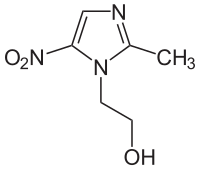
Photo from wikipedia
Preterm birth (PTB) is a social problem that adversely affects not only the survival rate of the fetus, but also the premature babies and families, so there is an urgent… Click to show full abstract
Preterm birth (PTB) is a social problem that adversely affects not only the survival rate of the fetus, but also the premature babies and families, so there is an urgent need to find accurate biomarkers. We noted that among causes, eubiosis of the vaginal microbial community to dysbiosis leads to changes in metabolite composition. In this study, short chain fatty acids (SCFAs) representing dysbiosis were derivatized using (N-tert-butyldimethylsilyl-N-methyltrifluoroacetamide, MTBSTFA) and targeted analysis was conducted in extracted organic phases of cervicovaginal fluid (CVF). In residual aqueous CVF, polar metabolites produced biochemistry process were derivatized using methoxyamine and N,O-bis(trimethylsilyl)trifluoroacetamide (BSTFA), and non-targeted analysis were conducted. Nine SCFAs were quantified, and 58 polar metabolites were detected in 90 clinical samples using gas chromatography/mass spectrometry (GC/MS). The criteria of statistical analysis and detection rate of clinical sample for development of PTB biomarkers were presented, and 19 biomarkers were selected based on it, consisting of 1 SCFA, 2 organic acids, 4 amine compounds, and 12 amino acids. In addition, the model was evaluated as a suitable indicator for predicting PTB without distinction between sample collection time. We hope that the developed biomarkers based on microbiota-derived metabolites could provide useful diagnostic biomarkers for actual patients and pre-pregnancy.
Journal Title: Metabolites
Year Published: 2022
Link to full text (if available)
Share on Social Media: Sign Up to like & get
recommendations!